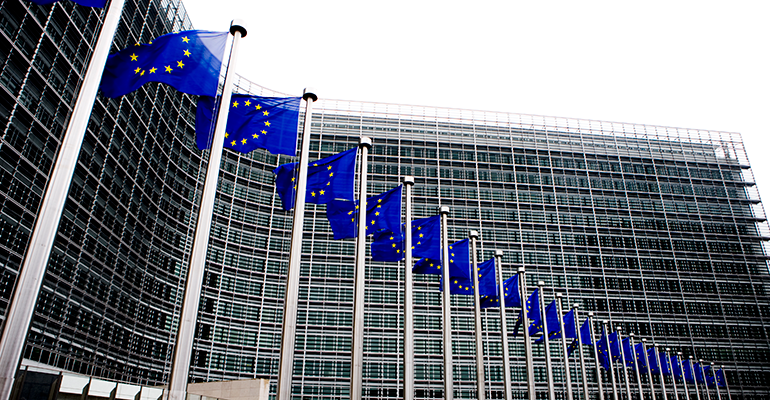News
The EU’s action plan to remain competitive
18 Oct 2024The EU has three main areas for action if it is to increase competitiveness in a global economy over the next five years, according to the Draghi Report. We look at what its findings mean for the food manufacturing and retail industry.

The EU Draghi Report, published last month, looks at the future of European competitiveness, exploring the challenges experienced by the European sector and businesses in the single market. Its recommendations will direct the EU’s direction for the next five years.
Hailed as a landmark exploration of the EU market, the 400-page report urges immediate funds and reforms to salvage Europe’s economic health and bridge the market’s gap with other global giants, the US and China. According to the report, the minimum investment sum required for this economic boost is €750-800 billion.
The report was penned by Mario Draghi, former European Central Bank President and, according to the European Commission, one of Europe's great economic minds and outlines his personal vision on the future of European competitiveness.
Three key areas for action
The report identifies three main areas for action.
“The first is aiming at closing the innovation gap with the United States and China. EU companies spent around €270 billion less on R&D than their US counterparts in 2021, largely because we have a static industrial structure dominated by the same companies and technologies as decades ago,” said Draghi in an address to the EU at the launch of the report.”
The second area for action is a joint plan for decarbonisation and competitiveness. “If Europe’s ambitious climate targets are matched by a coherent plan to achieve them, decarbonisation will be an opportunity for Europe. But if we fail to coordinate our policies, there is a risk that it could run contrary to competitiveness – and ultimately be delayed or even rejected,” said Draghi.
The third area for action is increasing security and reducing dependencies on foreign raw materials.
So, what does this mean for the food industry?
Looking beyond the proposed multi-billion investment needed to tackle the EU’s competitiveness are reform areas and actions to push the needle. With these, the aim is that Europe can achieve sustainable growth and competitiveness.
Following the report’s release, decarbonisation, strategic economic security, innovation, energy independence and defence are all leading priorities on the EU agenda. Within the first 100 days of the new European Commission’s mandate, a new Clean Industrial Deal will be presented for competitive industries.
Retailers, wholesalers and manufacturers
Retailers and wholesalers comprise the largest service sector, accounting for 10% of the EU’s gross domestic product (GDP). They are the primary private employer in Europe, offering employment to 26 million Europeans.
EU food shoppers now benefit from numerous innovations that have become commonplace, including food safety apps, environmentally-considerate food, e-commerce and convenient delivery options.
“We welcome the clear focus on investment, the energy, sustainability and technological transition, better quality legislation and the single market,” says Christel Delberghe, director-general of EuroCommerce, the trade association representing Europe’s retailers and wholesalers. “But, any effective EU competitiveness strategy needs to look beyond manufacturing and recognise the contribution of services,” Delberghe added.
The Draghi report acknowledges that the sector surpasses the US in mid-technology industries. Retail and wholesale are important for Europe’s competitiveness and have the potential to contribute even more.
“Retailers and wholesalers provide huge potential to scale up green and digital innovation,” Delberghe said. “We must also look beyond our borders and support diversification of global supply chains that help us remain both resilient and globally competitive.”
Related news

EU Omnibus proposal risks dismantling ESG protections for smallholder farmers
1 Apr 2025
Civil society organisations are calling on policymakers to reject proposed changes to EU sustainability legislation, saying they pose a risk to protections for smallholder farmers.
Read more
UK consumers could be eating cultivated meat within two years
26 Mar 2025
Cell-cultivated products (CCPs), from chicken nuggets to beefburgers, could be on UK supermarket shelves by 2027 after regulators launched a sandbox to accelerate approvals.
Read more
Future F&B flavours favour exploration and explosive taste profiles
25 Mar 2025
Exploration and experimentation will define the future of flavour, according to Mintel, as consumers seek out taste profiles and textures that offer an adventurous eating experience.
Read more
US wholesale egg prices plummet, but volatility remains
24 Mar 2025
Egg prices in the US fell sharply in March after supply improved – but risks from avian flu and other market factors keep long-term prices unpredictable.
Read more
Partnership plans to scale cultivated meat production
21 Mar 2025
Food technology innovator Ever After Foods (EAF) and multinational food leader Bühler are striving to overcome hurdles to access and accelerate the development of cultivated meat.
Read more
Global consumers enjoy food less and perceive it as less healthy
20 Mar 2025
Enjoyment of food and its perceived healthiness is dwindling among most global populations, according to findings from Gallup and Ando Foundation/Nissin Food Products.
Read more
Seafood set to ‘dethrone’ poultry as protein growth king
19 Mar 2025
Seafood is poised to surpass poultry as the leading contributor to global protein supply growth this year, according to Rabobank’s latest protein outlook.
Read more
What crops will thrive in the UK by 2080?
18 Mar 2025
By 2080, crops such as citrus fruits, chickpeas, and soybeans could become commonplace in the UK, while staples like wheat may struggle, scientists suggest.
Read more
Plans to abandon mandatory Nutri-Score labelling ‘would be a step back’
17 Mar 2025
Critics have slammed reports that mandatory Nutri-Score labelling is to be abandoned as “a step back” that puts citizens’ health at risk.
Read more
Food companies urged to bring ‘joy’ and urgency to healthy food mission
14 Mar 2025
For too long, businesses have treated health and sustainability as separate agendas – but there is growing evidence to show diets that benefit human health can also enhance that of the planet, say experts.
Read more